More than 140 young investigators will compete with oral and poster research presentations during the 16th annual Research Day held by the College of Veterinary Medicine and Biomedical Sciences on Saturday. The event showcases the work of research trainees in a variety of disciplines and gives them vital experience presenting their findings. Research Day runs noon to 6:30 p.m. at the Hilton Fort Collins; it is free, and scientists across the Colorado State campus are welcome! Here’s a snapshot of young researchers participating.
Elliott Chiu, D.V.M/Ph.D. student
Project: Bovine herpesvirus 4 not detected in free-ranging domestic cats from California, Colorado, and Florida 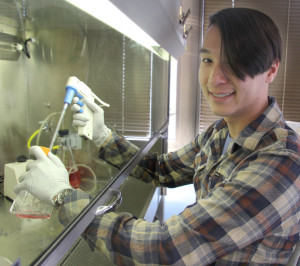
Advisor: Dr. Sue VandeWoude, CVMBS associate dean of research
Chiu examines genetic differences between domestic and wild cats. These differences play an integral role in infection and disease progression of one of the most common fatal infectious diseases of domestic cats, feline leukemia virus. The virus recently has spilled over into wild cat populations, threatening endangered species such as the Florida panther and the Iberian lynx.
“I like to solve problems, and conservation medicine is full of them,” Chiu said. “In order to best help individual animals or entire species, we must first understand the underlying processes that drive disease.”
An Dang, Ph.D. candidate, biomedical sciences
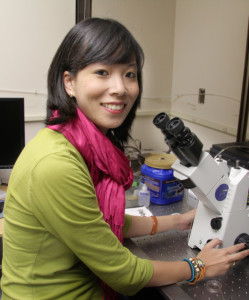 Project: Reactive oxygen species modulate local L-type calcium channel signaling in gonadotropes
Project: Reactive oxygen species modulate local L-type calcium channel signaling in gonadotropes
Advisor: Dr. Greg Amberg, associate professor of cardiovascular pharmacology
Dang studies the mechanisms within female hormone cells that are critical for ovulation and fertility. From the therapeutic perspective, these intracellular targets provide a focus for developing drugs that affect fertility.
“I am fascinated by my research,” Dang said. “These fundamental principles and the signaling processes can translate into future enhancements that modulate reproduction.”
Allison Genis, senior, biological sciences
Project: Cytokine enzyme-linked immunosorbent assays for the detection of Johne’s disease during pre-clinical stages in goats
Advisor: Dr. Torsten Eckstein, professor in microbiology, immunology, and pathology
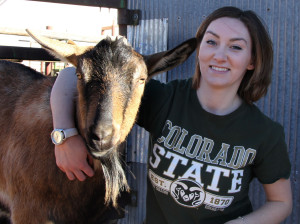 Johne’s disease is an inflammatory bowel disease caused by a gastrointestinal infection, resulting in a significant productivity loss in the dairy industry. Genis investigates cellular responses to infection using animal models. This is a key first step to designing diagnostic assays that can detect the infection early and prevent its spread through entire herds of dairy cattle and other ruminants.
Johne’s disease is an inflammatory bowel disease caused by a gastrointestinal infection, resulting in a significant productivity loss in the dairy industry. Genis investigates cellular responses to infection using animal models. This is a key first step to designing diagnostic assays that can detect the infection early and prevent its spread through entire herds of dairy cattle and other ruminants.
“I love puzzles, and I’m intrigued by the number of questions we still don’t have answers to,” Genis said. “Innovative scientists have created the world we live in today, and it would be great to become a part of that respected community. There are fields opening up as we design more advanced technology and even greater opportunities to make discoveries.”
Genevieve Hartley, Ph.D. candidate, cell and molecular biology
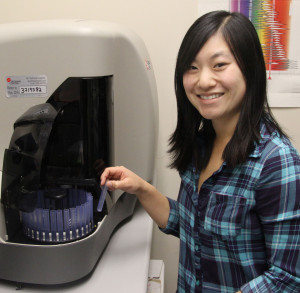 Project: Immune regulation of PD-L1 expression on canine tumors
Project: Immune regulation of PD-L1 expression on canine tumors
Advisor: Dr. Steven Dow, director of the Center for Immune and Regenerative Medicine at the James L. Voss Veterinary Teaching Hospital
Hartley’s translational research could help dogs with cancer – and also could shed light on human cancer. PD-L1 is an immune checkpoint molecule associated with poor prognosis in human and mouse cancers. By studying its expression and regulation in canine tumors, Hartley and her research team hope to block its activity and decrease immune suppression in dogs with cancer.
“I am fascinated by all the different ways tumor cells exert negative effects on the immune system, and I am hoping that my work will be a part of helping the countless people affected by cancer,” Hartley said.
Clare Hoover, anatomic pathology veterinary resident
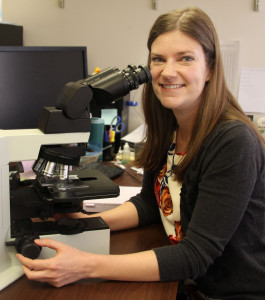 Project: Early prion trafficking in deer exposed to chronic wasting disease
Project: Early prion trafficking in deer exposed to chronic wasting disease
Advisor: Dr. Edward Hoover, University Distinguished Professor
Chronic wasting disease is a fatal neurodegenerative disease that affects deer in Colorado and around the country; similar diseases affect cattle, sheep, and people. Hoover’s research looks at where the infectious agent, a prion, is located in a deer shortly after infection, before symptoms appear. By understanding the early disease process, researchers hope to identify new targets for therapies.
“As a veterinarian, I like using my medical training to understand the basic pathogenesis of diseases to benefit both humans and animals,” Hoover said. “I also love coming into work and feeling like I can discover some new bit of information. And, for that brief moment, I’m the only person in the world who knows it.”
Albert Jeon, Ph.D. candidate, pathology
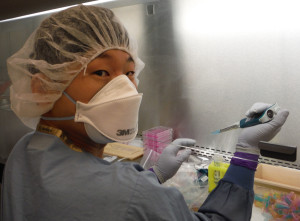 Project: Reversal of phenotypic and intrinsic antimicrobial drug resistance in Mycobacterium tuberculosis with 2-aminoimadazole based small molecule adjuvants
Project: Reversal of phenotypic and intrinsic antimicrobial drug resistance in Mycobacterium tuberculosis with 2-aminoimadazole based small molecule adjuvants
Advisor: Dr. Randall Basaraba, professor of mycobacterial pathology
The infectious disease tuberculosis is a leading cause of death around the world. Joen aims to use small molecule compound adjuvants to overcome the antibiotic resistance of Mycobacterium tuberculosis. The approach could boost immunity and improve therapeutic strategies for tuberculosis patients.
“Research fulfills my passion to discover unknown things about infectious disease and provides me with a valuable opportunity to contribute to society’s well-being,” Jeon said. “I would like to make a career in research that benefits both human and animal health.”
Steven Lakin, veterinary student
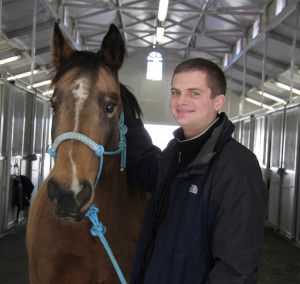 Project: The estrus cycle influences the bacterial microbiome in the normal mare reproductive tract
Project: The estrus cycle influences the bacterial microbiome in the normal mare reproductive tract
Advisor: Dr. Ryan Ferris, assistant professor of equine reproduction
Lakin is tracking changes in normal bacteria present in the reproductive tract of mares to better understand how equine reproductive disease is caused. Understanding the pathogenesis of disease could lead to the development of new treatments for horses.
“I find the potential for the integration of computational methods with medicine and biology fascinating, whether it is used to discover new therapeutic drug targets or to develop a personalized treatment plan for an individual patient,” Lakin said. “My passion is to contribute to a field that has the potential to advance the way we practice medicine and understand health and disease.”
Job Mapesa, post-doctoral fellow in environmental and radiological health sciences
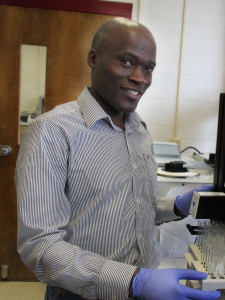 Project: Rice-bran phytochemical extracts inhibit invasion and intracellular replication of Salmonella in mouse intestinal and porcine jejunal epithelial cells
Project: Rice-bran phytochemical extracts inhibit invasion and intracellular replication of Salmonella in mouse intestinal and porcine jejunal epithelial cells
Advisor: Dr. Elizabeth Ryan, assistant professor of toxicology
Mapesa investigates how rice bran supplements for young children can reduce diarrheal infections caused by Salmonella poisoning. By understanding how dietary solutions can combat infection, Mapesa hopes to improve food systems and global health.
“My interest in research is not so much about the problems we face, but what I am able to do with the knowledge I have gained,” Mapesa said. “It’s dynamic and translational. My research gives me the opportunity to combine information from different fields, opening up more avenues and opportunities to practice the knowledge I have gained.”
Elena Ruggeri, Ph.D. student in biomedical sciences
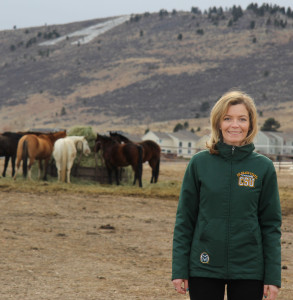 Project: Cytoskeletal alterations of equine oocytes that failed to cleave after ICSI: Evaluation of maternal and cell aging
Project: Cytoskeletal alterations of equine oocytes that failed to cleave after ICSI: Evaluation of maternal and cell aging
Advisor: Dr. Elaine Carnevale, associate professor of assisted reproductive technologies
Ruggeri investigates the effect of aging on fertility in the horse, focusing on meiotic maturation of the oocyte and embryo development in mares. She studies reproductive aging in the horse because physiology and infertility issues are similar to those in women. Ruggeri hopes her discoveries lead to improvements in the treatment of infertility in aging women.
“I am passionate and enthusiastic about doing research,” Ruggeri said. “Discovering new knowledge and making little steps towards new scientific ideas is my passion in life and truly makes me happy.”
Katie Schmitz, senior in food sciences
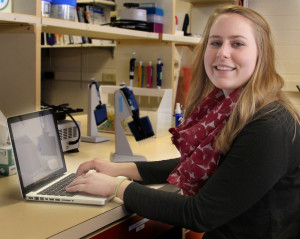 Project: Community-academic partnership to reduce cardiovascular disease risk in northern Colorado children with elevated cholesterol
Project: Community-academic partnership to reduce cardiovascular disease risk in northern Colorado children with elevated cholesterol
Advisor: Dr. Elizabeth Ryan, assistant professor of toxicology
Schmitz hopes her research sheds light on the role of nutrition – specifically rice bran and navy beans – in reducing cardiovascular disease and related deaths. In this project, she worked with area children with elevated cholesterol levels.
“I love research because I am constantly learning new information through the numerous and diverse projects with which I assist,” Schmitz said. “No two days are the same in the lab, and overall it has been an invaluable part of my undergraduate experience.”